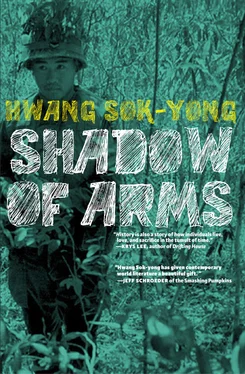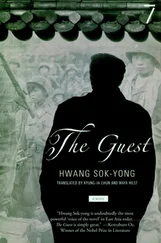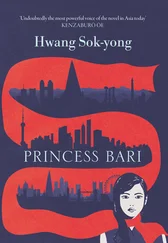McCoy: That’s not true. I didn’t start it. I had to follow the orders of Lieutenant Sloat.
Sloat: All right. I’ll tell you. The interrogation had gone on until three in the afternoon, but we kept getting the same damned answer from the boy, who claimed he was headed for his sister’s house. So I said we’d have to intensify the interrogation. So I sent Nguyen to fetch a kettle of water.
Nguyen: That’s different from the facts. I opposed rough treatment. Almost all Vietnamese are Buddhists. As you may know, the greater the agony, the harder Buddhist believers fight to endure it. They’d rather seal their lips and choose death.
Interrogator: But wasn’t he just a small boy?
Nguyen: True, but any human who’s treated cruelly tries to triumph over the pain, out of hate for the enemy. Sergeant McCoy’s blow ended our interrogation before it started.
McCoy: Shut up! Fuck, that wasn’t a real blow.
Interrogator: Sergeant, watch your language. You’re under investigation here. This investigation is being conducted by order of the high command of the US-Vietnam forces with the intention of vindicating US military regulations and methods of wartime operations. Accordingly, atrocities against prisoners of war or suspects are absolutely prohibited, regardless of rank or mission. Witness, please proceed with your statement.
Cole: McCoy complained about having no time to spare, saying he knew plenty of good methods. And Lieutenant Sloat asked me if I had any effective way to make the boy open his mouth. I did not want to hear anybody saying I’d taken part in it, even afterwards, so I just kept my mouth shut. But then McCoy struck the boy again in the face with his fist. The boy, still tied to the chair, was knocked over backwards onto the floor.
Brown: I was standing a little back, and I sat the chair back upright and saw that the boy was not moving. He seemed to have fainted. Blood was running down his face.
Nguyen: I swore at Sergeant McCoy, calling him a barbarian. It would have gone much better if we’d given the boy some food to eat. You could see he had eaten nothing the whole day.
McCoy: The lieutenant was the one who ordered us to intensify the interrogation.
Sloat: That’s misleading. The fact that I said to increase the intensity of the questioning was not an order to engage in torture.
Nguyen: It’s true that the lieutenant was angry at the sergeant. Lieutenant Sloat shouted at Sergeant McCoy to get out, saying he wouldn’t let him get away with such brutality. And when the sergeant left, he swore at him, calling him a stupid bastard of a lifer. The lieutenant seemed worried about leaving evidence behind. He ordered for a medic.
Brown: The lieutenant sent me out to get a medic and said the medic should bring drugs to give the boy a shot to wake him up. When I asked whether we shouldn’t treat his wounds first, the lieutenant flew into a rage. He told me to hurry up and bring a medic with a syringe of stimulants before he smashed my face. I ran out. It happened that the whole prison was getting vaccinations and I managed to find a medic and bring him back to the Quonset. The medic took out a little vial of clear liquid and gave the boy an injection. A moment later, his head began to move.
Cole: The Vietnamese sergeant resumed his questioning, but the boy only kept moaning “No” or “I don’t know.” Lieutenant Sloat kept pacing around the room, boiling with anger, and then he called out for Sergeant McCoy. The lieutenant told McCoy not to be too rough with the boy, to do it skillfully. The lieutenant sat down beside the boy and McCoy pulled his head backward. Then they slowly poured water from the pot into the boy’s mouth and nose.
McCoy: All I did was hold him down.
Nguyen: He ordered me to bring the pot over from the desk and pour it. I turned my head away and did as told. Every now and then the lieutenant told me to stop and asked something in English, which I in turn asked the boy in Vietnamese.
Cole: But that didn’t do anything.
Interrogator: So you moved up to the next level of torture? I mean, the shock treatment, using the field telephone as a generator?
Cole: No. Before that I asked Lieutenant Sloat to let me go back to my cell. The lieutenant tried to convince me to stay, asking what was waiting for me back in prison except hard labor. But I told him I didn’t want any part of this.
Sloat: I wasn’t the one who had picked out his personal record card. The senior staff was responsible. They said I could promise him that if he managed to get the suspect to reveal information with combat value, they’d restore his officer’s rank and send him back to his unit. He was a very competent interpreter.
Interrogator: Who was the next person to commit an atrocity and what did he do?
Brown: I saw it all with my own eyes. Sergeant McCoy made me bring some water. I brought a full basin over and then McCoy taped an electric cord on the back of that poor boy’s heel.
Interrogator: Lieutenant Sloat, did you order him to do it?
Sloat: No, sir. I left for a short time to make a report to my superior. Even as I was out, a fierce enemy attack was underway. For purposes of minimizing casualties on our side, we couldn’t afford to lose a single second in locating the guerrilla hideouts.
Interrogator: Sergeant Nguyen, the cruelty continued even after the lieutenant returned, didn’t it?
Nguyen: If he lowered his hand I kept it running, and when he raised his hand I stopped.
Interrogator: So, Nguyen had the power running and the lieutenant sent the signals. What were you doing, Sergeant McCoy?
McCoy: I wrote down the suspect’s statements as they were interpreted.
Brown: Before that, McCoy had put the boy’s feet, taped with the electric cord, into the basin of water, and then he tied both the boy’s legs to the chair. When the power was turned on, the boy let out a faint moan and his whole body shook. The boy couldn’t endure that for long, and he went limp.
Cole: After that the boy came to and fainted three more times. Still he only talked of his sister’s house. I said we should stop because we wouldn’t get anything more out of the boy. Sloat said that somewhere the Viet Cong were at that very moment getting ready to attack, and asked me to interpret the boy’s shrieks. I did. I even included when he said things like “dear Buddha” or “Momma” or “bastard” or “help me” and so on. It felt like I was the one being tortured. Over and over I kept saying the boy seemed to be telling the truth, it really was possible he meant to sell the grenades on the black market and that he meant to give the money he made to his sister.
Brown: McCoy said mockingly that yeah sure, that was possible. But even if he had a sister, McCoy said, she had to be a whore. He glared at us and kept saying that the boy had been caught red-handed carrying enemy supplies. That was when Marvin said that if the boy wasn’t a guerrilla, he sure as hell would become one when he got back home to his village and next time he’d be throwing grenades at us. McCoy got so mad he grabbed Marvin by the throat and pushed him against the wall.
McCoy: The operations guidelines issued by headquarters clearly state that any Vietnamese, regardless of age or gender, we run upon at a line of contact must be assumed to be a guerrilla. What were we supposed to think about a boy who was lugging grenades in a zone where we were conducting a desperate search-and-destroy mission?
Cole: I felt so suffocated I couldn’t budge even after I heard Lieutenant Sloat shout, Sergeant! He’s a prisoner now but he’s still an officer. Stop!
Nguyen: As soon as Sergeant McCoy stopped choking the officer by the neck, he turned and struck the boy in the face again with his fist. The boy fell sideways with the chair onto the floor. The medic was on standby in the other room with his kit, so he was brought back in and gave the boy another shot on the lieutenant’s order. There was a gash under the boy’s left eye. His ribs started to move, and a minute later the boy was breathing again.
Читать дальше












